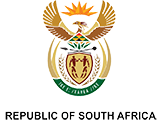Economic reforms
Economic reform is being driven through Operation Vulindlela, which involves a team in the National Treasury and President Cyril Ramaphosa’s office. Operation Vulindlela focuses on fast-tracking reforms in the electricity, water, telecommunications and transport sectors, as well as reforms to our visa and immigration regime.
Water
In the water sector, Operation Vulindlela is ensuring that water licence applications are finalised within the revised time frame of 90 days, and that the Blue Drop and Green Drop municipal water quality programmes are revived to strengthen water quality monitoring.¹
The publication of Green Drop, Blue Drop and No-Drop reports to assess the state of water quality, wastewater treatment and water infrastructure at municipal level played an important role in identifying and addressing challenges in the water system.These reports will be reinstated alongside other measures to strengthen the water quality monitoring system.²
A revised raw water pricing strategy is necessary to ensure the accurate and fair pricing of water according to the user-pays principle, ensuring that future investments in water infrastructure can be sustained at the level required.²
Fast-tracking the processing and issuance of water use licenses is essential to promote investment in forestry, agriculture, mining and other sectors.²
In addition, the establishment of a national Water Resources Infrastructure Agency will be accelerated, and Durban is being positioned as a hub port for the southern hemisphere, and Ngqura as the container terminal of choice.¹
South Africa needs to expand its bulk water infrastructure and improve the management of existing water assets to ensure water security over the next decade.²
The agency will be responsible for developing and managing national water infrastructure, and will be able to mobilise finance for new projects through innovative models to crowd in private investment.²
Furthermore, reducing costs and improving the efficiency of South Africa’s ports is crucial to the competitiveness of our exports and the overall functioning of the economy.²
Rail
The rail corridor from Gauteng is being extended to enable the export of vehicles through Port Elizabeth.
Rail is under-performing as a mode of freight and commuter transport relative to road transport in South Africa, and extensive reform of the rail sector is required.The draft White Paper on National Rail Policy comprehensively sets out Government’s remedial interventions to achieve a rail renaissance in the country, in order to make rail a competitive mode of freight and commuter transport.²
Digital migration
The phased switch-off of analogue TV transmitters and phased migration to digital begins next month. This process is due to be completed by March 2022.²
The migration from analogue to digital signal is necessary to free up additional spectrum for mobile telecommunications. At the time that the 2021 SONA was delivered in February 2021 analogue television signal occupied much of the highly valuable 700MHz and 800MHz frequency bands. As the switch-off of analogue transmission towers begins in March 2021 low-income households will be provided with a set-top box or a voucher to subsidise their purchase of a set-top box to ensure that they do not lose access to broadcasts when the transmissions become digital. Operation Vulindlela is working with the Department of Communications and Digital Technologies to ensure that targets for the completion of digital migration are achieved.²
In SONA, we said that the long-awaited digital migration would proceed, and the switch off of analogue transmission towers has begun in a number of provinces after a six year delay.https://t.co/Dlgnae551B
— Cyril Ramaphosa 🇿🇦 #StaySafe (@CyrilRamaphosa) June 3, 2021
Immigration
Work is underway with the relevant departments to reform South Africa’s visa and immigration regime, to attract skills and grow the tourism sector. A full roll-out of eVisas to visitors from China, India, Nigeria, Kenya and 10 other countries will be undertaken.¹
South Africa’s approach to critical skills and general work visas should be designed to attract the skills that are needed for the economy to grow, and to compete for these skills in a globally competitive market.²
One of the government's key priorities is to make it easier for tourists to visit South Africa, enabling the recovery and growth of the tourism sector in the aftermath of COVID-19.The e-Visa system will be fully implemented in 2021 following its pilot in 2020.²
News archive
SA to complete digital migration process in March 2022 https://t.co/RYYF58nhqG
— BusinessLIVE (@BusinessLiveSA) February 11, 2021

